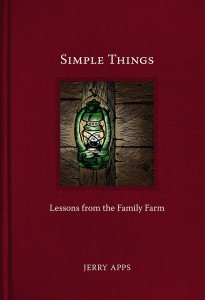 Ropes of diamonds and gold are not for you. A fancy car has no place in your garage, your home isn’t TV-worthy, and you’re happy with uncomplicated meals, hold the mustard. While it’s nice to have luxuries, you recognize your quieter needs – and as in the new book “Simple Things” by Jerry Apps, you’re grateful for them, too. When Jerry Apps was born on a little farm in rural Wisconsin in the midst of the Great Depression, his parents didn’t enjoy the benefits of electricity or running water. Those things didn’t arrive at the Apps house for many years, so the family led a simple life with a bounty of goodness. For instance, on the farm, Apps says, one of the first things you learned was to appreciate tools. Different kinds of shovels did different kinds of jobs, and a boy knew he was a man when he had his own three-tined pitchfork. Apps’ dad was never without a pocket knife or pair of pliers, and Apps’ mother had a different kind of tool: her apron, which was also a towel, hot pad and tear-wiper. Today, we notch up a thermostat when the temperature dips, but in the Apps household, keeping warm was a complicated task. Apps says his father rose early each day to start fires in the two wood-burning stoves that kept the family warm,
Ropes of diamonds and gold are not for you. A fancy car has no place in your garage, your home isn’t TV-worthy, and you’re happy with uncomplicated meals, hold the mustard. While it’s nice to have luxuries, you recognize your quieter needs – and as in the new book “Simple Things” by Jerry Apps, you’re grateful for them, too. When Jerry Apps was born on a little farm in rural Wisconsin in the midst of the Great Depression, his parents didn’t enjoy the benefits of electricity or running water. Those things didn’t arrive at the Apps house for many years, so the family led a simple life with a bounty of goodness. For instance, on the farm, Apps says, one of the first things you learned was to appreciate tools. Different kinds of shovels did different kinds of jobs, and a boy knew he was a man when he had his own three-tined pitchfork. Apps’ dad was never without a pocket knife or pair of pliers, and Apps’ mother had a different kind of tool: her apron, which was also a towel, hot pad and tear-wiper. Today, we notch up a thermostat when the temperature dips, but in the Apps household, keeping warm was a complicated task. Apps says his father rose early each day to start fires in the two wood-burning stoves that kept the family warm,  putting a bucket of water on one stove to thaw for coffee-making. He then lit a fire in the pump house, one beneath the cattle water tank, one in the “potato cellar,” and then he started barn chores. “Not once did I hear him complain,” says Apps. “It was winter, after all, and that is what you did when you lived on a farm in Waushara County in 1946.” Back then, it was scandalous when one had a messy haystack, and Christmas meant two gifts: an article of clothing and one toy. A radio plus an imagination were all the entertainment a boy needed, except for the stories told on the porch, at the feed mill, and at the Mercantile on Saturday night. No celebrity gossip. No bumper-to-bumper traffic. No bars on windows and deadbolts on doors. No need to imagine, just read “Simple Things: Lessons from the Family Farm,” instead. Better yet, read it with someone who was also a mid-century kid, because author Jerry Apps’ words will lead to conversations you’ll be glad you had and surprise stories you’ve never heard before. Apps is a master at description, so it’s hard not to take a magic feed-sack ride back seventy years when reading this book, hard not to hear farm sounds, and impossible not to miss your grandparents fiercely. Indeed, this book may be slim (138 pages), but it’s big on tale-telling and even bigger on nostalgia. You may notice some repetition here and there inside this book, but you probably won’t mind a bit. It’s too charming for that. In fact, if you’re a certain age or you grew up on a family farm, “Simple Things” will be a gem.
putting a bucket of water on one stove to thaw for coffee-making. He then lit a fire in the pump house, one beneath the cattle water tank, one in the “potato cellar,” and then he started barn chores. “Not once did I hear him complain,” says Apps. “It was winter, after all, and that is what you did when you lived on a farm in Waushara County in 1946.” Back then, it was scandalous when one had a messy haystack, and Christmas meant two gifts: an article of clothing and one toy. A radio plus an imagination were all the entertainment a boy needed, except for the stories told on the porch, at the feed mill, and at the Mercantile on Saturday night. No celebrity gossip. No bumper-to-bumper traffic. No bars on windows and deadbolts on doors. No need to imagine, just read “Simple Things: Lessons from the Family Farm,” instead. Better yet, read it with someone who was also a mid-century kid, because author Jerry Apps’ words will lead to conversations you’ll be glad you had and surprise stories you’ve never heard before. Apps is a master at description, so it’s hard not to take a magic feed-sack ride back seventy years when reading this book, hard not to hear farm sounds, and impossible not to miss your grandparents fiercely. Indeed, this book may be slim (138 pages), but it’s big on tale-telling and even bigger on nostalgia. You may notice some repetition here and there inside this book, but you probably won’t mind a bit. It’s too charming for that. In fact, if you’re a certain age or you grew up on a family farm, “Simple Things” will be a gem.
